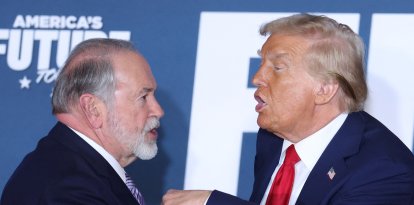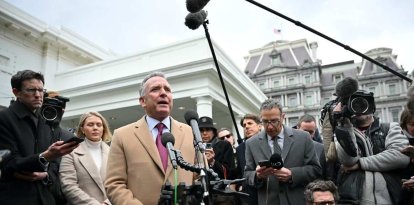Liberation Day: What are the consequences of Trump's tariffs?
The president has announced the imposition of tariffs on virtually all countries. Although he claims that we do not live in a world with free trade and that countries should reduce their tariffs, several scenarios could emerge in the coming months.

President Trump at the White House
Liberation day? While some are calling President Trump's tariff plan a strategy to achieve freer international trade, others claim that this administration could plunge the world into a new era of protectionism.
The reality is that it's hard to predict what's coming. Yesterday, in his speech, the president asked whether we really have free trade while presenting a graphic with the taxes to be imposed on all countries. And we should all be honest and agree with him that international trade is riddled with barriers, but what is the best way to achieve freer international trade? Is the goal of this administration free trade or to institute harsh protectionism? And what are the consequences for the United States?
Free trade?
There is no free trade. The president is right to point out that tariffs internationally are high and that for years, the U.S. has dealt with countries that impose substantial barriers to the entry of U.S. goods. In his speech, he said the following:
"Everyone who will soon be calling to ask for exemptions from these tariffs. I say terminate your own tariffs, drop your barriers, don't manipulate your currencies. They manipulate their currencies like nobody can even believe."
These statements imply that the president ultimately intends for truly free trade. However, it is also true that within the administration, there are very important figures whose ultimate goal, because of their protectionist vision of the economy, is to maintain barriers for a long time and ensure that the majority of products are produced in the United States.
Reordering of international trade
Although different economists make predictions of how much these measures may affect various product groups, the reality is that we are on uncharted territory. There are many actors at play and very different possible outcomes.
Is this a negotiation? It is unclear if the idea is to maintain these tariffs under a protectionist vision or if it is a tool to pressure countries. Carlos Gutierrez, President George W. Bush's secretary of commerce, has described the situation as the "beginning of a great negotiation" and has even said that these tariffs will no longer be enforced in a couple of months and will definitely be gone by the second half of the year.
We do not know how the negotiations will end, but there will come a period in which some countries will try to reach some agreement, so trying to predict the effect the tariffs will have is not very accurate. Although the United States will be affected by the tariffs, it is mainly the other countries that will be hit, and many of them, even if they do not feel like lowering their heads, will probably try to negotiate.
So, there is a real possibility that this situation could end in a much freer world of trade. It will depend on President Trump's willingness to negotiate and on countries coming up with good proposals and lowering their tariffs on the United States.
However, the opposite scenario is also possible. It is not clear if this is the best way to push for a tariff reduction, as along the way, several important countries could decide to take a strong defense and, as a first step, raise taxes, leading us to a scenario of generalized tariff hikes. This seems less likely, but it is possible.
On the other hand, some experts warn that China could take advantage of this situation and establish new relations with U.S. allies.
Consequences for Americans
Price increases will not necessarily be seen immediately. Many stores have an inventory of imported products that could be affected that can last for a couple of months without price changes. This gives room for negotiations with the countries.
Things are easy in a scenario in which we move to a freer world, but if we stay with the scenario in which tariffs remain high, the consequences will depend on different factors, such as the decisions made by the administration in macroeconomic terms.
Capital Economics estimated that the revenue increase of these new tariffs is likely to be close to $700 billion. If that money is used to ease the burden on people and businesses, the hit from the rise in prices could be contained to a reasonable extent. The administration should rush to cut individual and business taxes. It should also cut regulation and ease the burden on those affected companies, either because they must import products that are now more expensive or because they export products that will be affected by possible retaliation from countries.
RECOMMENDATION





















